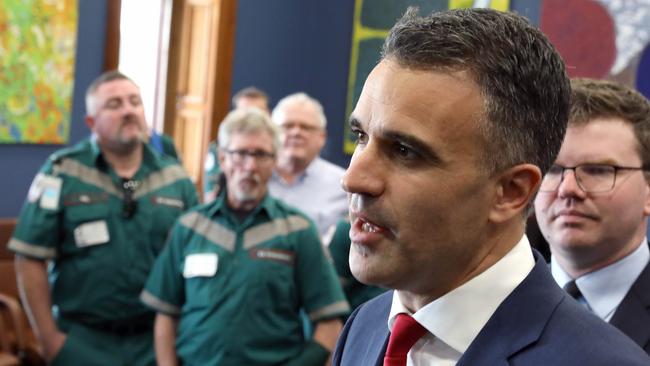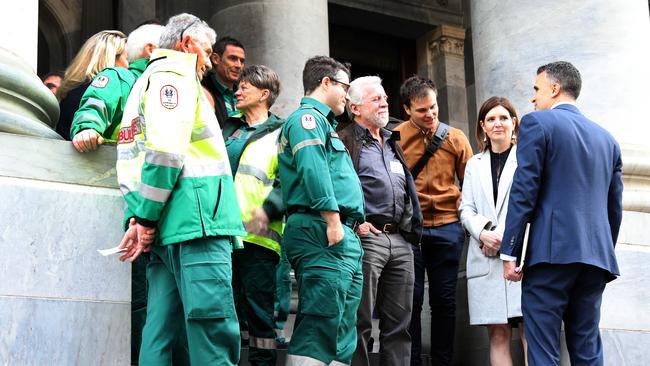Labor risks Transforming Health legacy tarnishing ramping campaign
Labor risks ghosts from the past overwhelming its ambulance ramping campaign – and is losing focus on its narrative of creating jobs, Paul Starick writes.
Opinion
Don't miss out on the headlines from Opinion. Followed categories will be added to My News.
At the roulette wheel of a state election campaign, Labor leader Peter Malinauskas is at risk of throwing down too many chips on health.
Thus far, Labor is banking some wins, gaining traction with a narrative about Liberal cuts plunging the state into a dangerous hospital overcrowding and ambulance ramping crisis.
This feeds off heightened insecurity about personal and public health triggered by the biggest upheaval in our daily lives since World War II – the Covid-19 pandemic.
Even in the mostly Covid-free oasis of South Australia, we have stoically endured unprecedented intrusions on civil liberties for the greater good of preserving our collective health.
About 18 months ago, closure of state and national borders, lockdowns and QR code scanning would have been preposterous. In the early days of the pandemic, wide parts of society shut down to avoid viral transmission overloading hospital intensive care wards.
Little wonder, then, that voters are particularly attuned to criticism of government management of the public health system.

But there are three traps for Labor as its public message is overwhelmingly focused on health. Firstly, the legacy of its 16 years in office, most notably the disastrously mismanaged Transforming Health policy.
Secondly, the relatively limited number of interactions people have with the public health system compared to the daily relief, thus far, that SA has escaped the ravages of Covid-19. Thirdly, perhaps most importantly, the recognition that our state and nation has a globally outstanding public health care system, with comparatively minor systemic problems that no government will be able to completely and irrevocably solve.
Liberal spin doctors are relishing the prospect of an election fought over health. Even allowing for the intrinsic theatrics of the dark arts of spin, they have a substantial point.
Mr Malinauskas was health minister from September 18, 2017 until the state election in March 2018, at which Labor was thrown out of power.
On November 17, 2017, he told parliament: “Transforming Health, despite the cynics, despite the scare mongering that has occurred perennially from the (Liberal) opposition, has delivered good results for our public health system. And that’s something that our government can be proud of, but we want to continue that work into the future.”
On Thursday morning, after The Advertiser revealed his plan to scrap the proposed $662m Riverbank Arena to plough the money into health, Mr Malinauskas was confronted with the ghost of Transforming Health.
ABC Radio Adelaide announcer Ali Clarke asked Mr Malinauskas about listeners challenging him about Transforming Health’s legacy.
He tried to wash his hands of the failed scheme, declaring he was not in parliament when it was devised or decided upon. Then he declared: “I think that Transforming Health had major failings and when I was the Health Minister for that five-month period … I started to make big decisions to fix it.” These included, he said, funding of $350m and $92m for the Queen Elizabeth and Modbury hospitals respectively.

In recent weeks, Labor has claimed ambulance ramping is front and centre of the public mind. Yet it is arguable that this uppermost concern is confined to those who have had bad experiences, along with their families and friends. This is not to dismiss the severity of the sometimes tragic events – just to contest their potential political impact.
On the final front, governments have had to contend with criticism about the health system for generations. Earlier in June, a former senior state Labor MP emailed a scanned 1980 newspaper report about the mess the SA hospital system was in at that time. This detailed scandals including overspending, significant overstaffing at Flinders Medical Centre and the Glenside Hospital head cook supplying Ayers House with pilfered food.
Former Labor health minister John Hill, among the most accomplished SA politicians of the past 25 years, wrote about the challenges of dealing with ramping at Flinders Medical Centre during the Rann government in his 2016 book, On Being A Minister. Today’s Liberals have seized on this episode, with questionable success, in their bid to explain FMC capacity issues during an emergency department upgrade.
One key point, though, is that the government expects almost 100 metropolitan emergency department treatment spaces to open within the next year.
Mr Malinauskas in May declared Labor had to focus first on creating jobs, then important causes like health and education. In March, he vowed to build, if elected, a $593m hydrogen power plant to generate thousands of jobs.
In the months ahead, he will have to focus more on producing plans for jobs and prosperity to show he is ready to lead the state.



